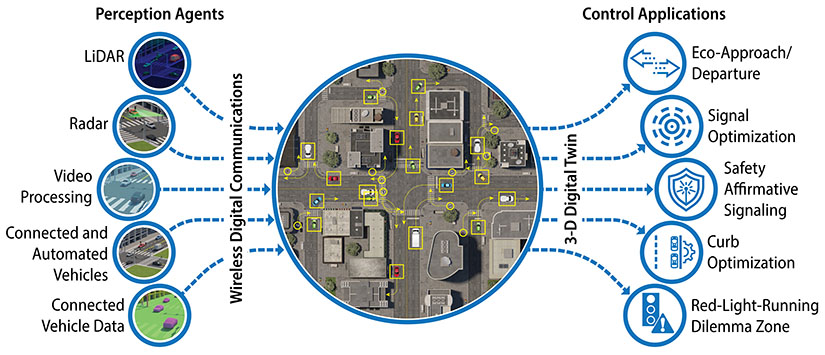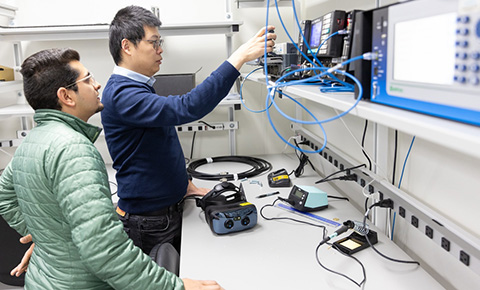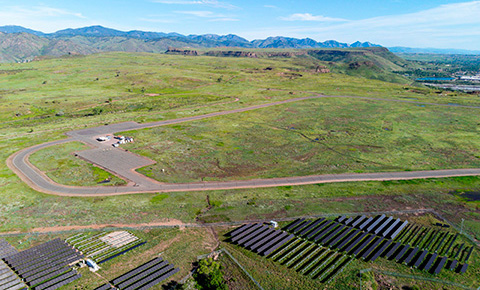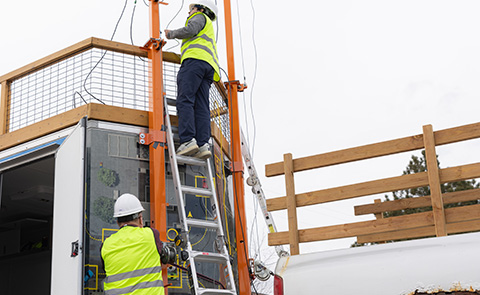Infrastructure Perception and Control Laboratory
NLR's Infrastructure Perception and Control (IPC) lab applies advanced sensing and computational controls to the coordinated movement of vehicles on the road as well as people in large facilities.
The IPC lab builds on the evolving role advanced sensing and computational controls play in connected and automated movement. The benefits of this approach range from increased safety to reduced travel time and energy use for mobility across various realms.

The IPC pipeline integrates sensed data from a variety of sources to develop advanced computational controls designed to improve the energy and time efficiency of mobility. Figure by Stan Young, NLR
Capabilities
The following examples highlight the breadth of work the lab enables:
- Advanced traffic control at intersections, enabling traffic-signal optimization and subsequent energy savings while increasing safety and overall system efficiency
- Longitudinal light signals along lane lines, similar to coordinated Christmas lights, to guide drivers to self-organize and platoon, improving traffic flow and signal-timing efficiency
- Automated valet service integrated with automated electric charging to boost system-level efficiencies
- Advanced wayfinding and local positioning for navigating within large facilities, particularly as it impacts passengers who may need mobility assistance (e.g., with moving around airports)
- New tools and methods to better observe and understand human behavior, including factors influencing mode choice and the adoption of emerging mobility technologies.
Equipment and Facilities
The lab hosts essential equipment as well as state-of-the-art visualization capabilities, modeling tools, and research expertise to support NLR's pioneering IPC research. The lab is outfitted with modern equipment—including traffic control cabinets, radar, light detection and ranging (LiDAR), and video imaging equipment—that can be configured to take on the road as researchers work with partners across the country.
The IPC lab comprises three tiers enabling evaluation and development at progressive stages.
Tier One
Tier one features indoor lab space for concept exploration, development, and prototyping. World-class modeling and simulation capabilities can integrate with devices to create a hybrid virtual-reality experimental facility.

Researchers adjust the equipment in the IPC lab. Photo by Joe DelNero, National Laboratory of the Rockies
Tier Two
Tier two consists of a closed test track and partner-specified protected roadways to provide safe vehicle- and infrastructure-in-the-loop evaluation environments.
Tier Three
Tier three has public roads with advanced sensors, selected via established collaborations with partnering cities.

Aerial view of test track and solar array at NLR’s South Table Mountain campus. Photo by Joshua Bauer and Bryan Bechtold, National Laboratory of the Rockies
Connecting the Tiers
The indoor lab space (tier one) bridges to the test roads (tiers two and three) via digital-twin technologies featuring high-fidelity modeling; high-performance computing, simulations, and visualizations; large-volume data streaming and processing; and advanced controls and optimization techniques. A trailer serves as a mobile lab where researchers can transport, deploy, and adjust technologies among the tiers.

The IPC research team takes the mobile lab on the road and sets up advanced sensing equipment on location. Photo by Joe DelNero, National Laboratory of the Rockies
Contacts
Contact us to explore IPC partnership opportunities.
Share
Last Updated Dec. 6, 2025
